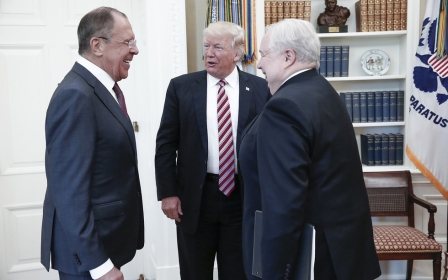Evacuation of rebel Damascus district begins

Civilians and rebels began evacuating a third opposition-held district of Damascus on Sunday, bringing the government closer to cementing its control over the Syrian capital.
An AFP correspondent inside Qaboun saw around 10 buses carrying out residents and fighters in the morning after a deal for the neighbourhood was announced late Saturday following heavy fighting.
The agreement mirrors those implemented earlier this week in the nearby rebel-held districts of Barzeh and Tishrin.
State media announced that the evacuation had started, and an activist inside the remaining opposition-held part of the district earlier confirmed that preparations for the operation were underway.
"The buses are being prepared, they are waiting in the areas controlled by the regime," Odai Awdeh told AFP.
"The names of those who want to leave, whether civilians or fighters, are being registered," he said.
The evacuation deal came on Saturday night after government forces advanced inside the neighbourhood.
"The Syrian army yesterday managed to encircle dozens of armed elements inside Qaboun neighbourhood, forcing them to surrender and hand over their weapons," a source from the pro-government National Defence Forces militia told AFP.
The deals for Qaboun, Barzeh and Tishrin neighbourhoods follow a pattern of agreements under which the rebels agree to surrender in exchange for safe passage to opposition-held territory elsewhere.
The government says the deals are the best way to end the six-year war. The opposition says it is forced into the agreements by government bombardment and siege.
Two groups of evacuees left Barzeh neighbourhood this week, with one leaving from Tishrin.
All three headed to Idlib province, in northwest Syria.
The negotiations on evacuating Qaboun had stalled earlier this week over demands that some rebels be allowed to head to Eastern Ghouta, rebel-held territory outside Damascus.
But the National Defence Forces source and the Syrian Observatory for Human Rights monitor said the final agreement only allowed evacuees passage to Idlib.
'They besieged us'
Syrian President Bashar al-Assad has promoted the use of such evacuations, along with what his government calls "reconciliation" deals for rebel-held areas that surrender to the government.
The United Nations has criticised both the use of siege tactics that precede such deals and the evacuations themselves as amounting to forcible displacement.
The Sunni rebels accuse the government of seeking to evict Sunni inhabitants in these areas in demographic changes they say will eventually pave the way for Iranian-backed Shias who back Assad's rule to take over their homes, a claim the authorities deny.
Army advances were made possible after tunnels between Qaboun and Barzeh were cut and the army isolated the areas from the rest of the main rebel enclave of Eastern Ghouta.
The tightening of the siege in the two districts, where tens of thousands of people lived, forced the hands of rebels to agree to deals worked out elsewhere that force them to pull back to northern Syria.
"They besieged us and even medicines for children or any supplies were no longer left ... and people died of hunger," said Ahmad Khatib, who was among those who left on Friday.
The densely populated rural Eastern Ghouta district of farms and towns has been besieged since 2013. It remains the only major rebel bastion near Damascus, and the fall of Qaboun and Barza has removed a main line of defence that protected it, rebels say.
Damascus has been insulated from some of the worst violence of Syria's war, which has killed over 320,000 people since it began with anti-government protests in March 2011.
The government has made securing control of the last remaining rebel districts in the capital a priority.
Stay informed with MEE's newsletters
Sign up to get the latest alerts, insights and analysis, starting with Turkey Unpacked
Middle East Eye delivers independent and unrivalled coverage and analysis of the Middle East, North Africa and beyond. To learn more about republishing this content and the associated fees, please fill out this form. More about MEE can be found here.




